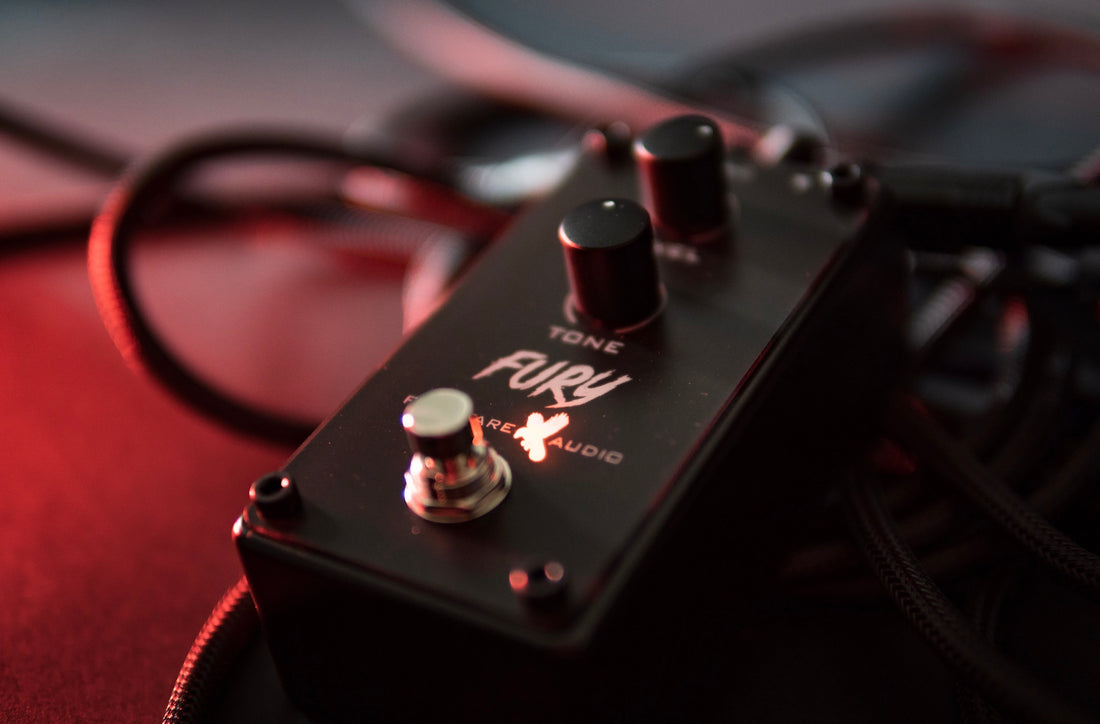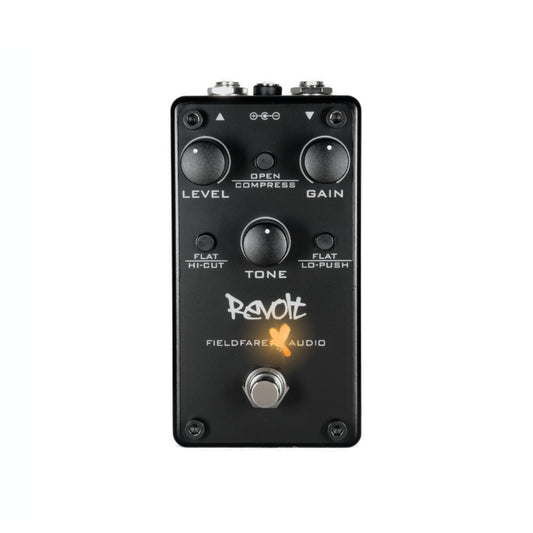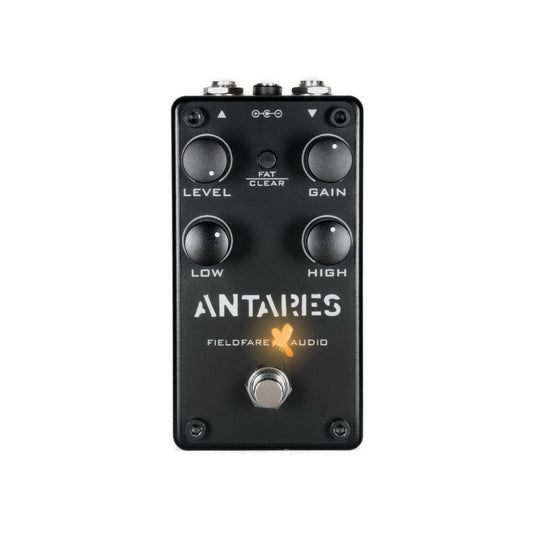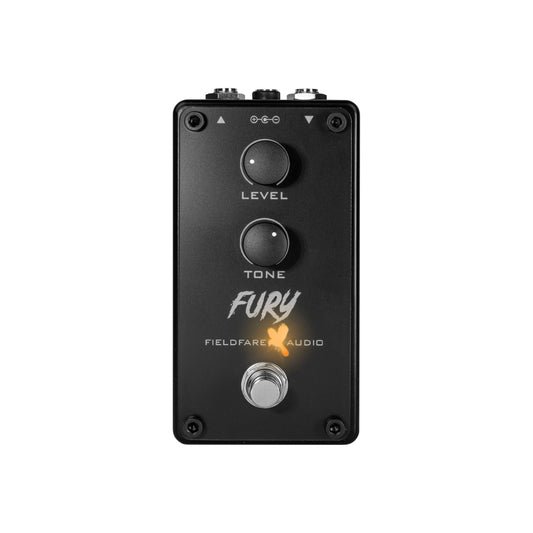
Fieldfare Audio Blog - Boutique Effects Pedals
Share
Table of contents:
- Introduction
- What are boutique effects pedals?
- How to choose the right boutique effects pedal
- Our personal top 3 boutique effect pedals
- Conclusion
- Sources
Introduction:
Boutique effects pedals have a long history. The history of such effects pedals is a fascinating one, and it's precisely for this reason that one might wonder how they came to enjoy increasing popularity, often for guitar and bass products from small pedal manufacturers like us.
The first effects pedal manufacturers are world-renowned, and their pedals remain highly popular over the years. Pedals from MXR, Fjord, Strymon, Chasebliss, and Proco can be found on countless guitar and bass players' guitars.
The manufacturer's preferred musical style often characterizes the sound of the respective pedals. They are often modeled after classic pedals or, as in our case, reimagined with useful adjustments and modifications such as mods. These days, it's usually the best of old and new. They're modern analog circuits with a variety of sound options.
These types of effect pedals are particularly attractive to musicians of stringed instruments, as the originals are often prohibitively expensive. This makes it easier than ever to add a piece of pedalboard history to your pedalboard. Whether you're a musician in music production or with a live band, there's something for everyone.

What are boutique effects pedals?:
Multi-effects remain among the most popular pedals, naturally, thanks to their enormous range of functions and diverse possibilities. Nevertheless, effects like boutique effects pedals, with their unique sounds, can still be found on almost every pedalboard. The idea that everything new has been invented by now is misguided. Like us, other pedal manufacturers are constantly inventing new ways and means to positively modify the sound of individual pedals using the latest technology.
Boutique pedals are handcrafted from high-quality materials and perfectly matched parts and components. They are often handcrafted in small batches, just like our pedals. Combined with a sophisticated and unique design and striking sound, this is arguably part of the definition of boutique effects for guitar and bass.
How to choose the right boutique effects pedal:
Boutique pedal or would you rather go for an off-the-shelf one? This is a question many guitarists are likely to ask themselves. Given our professional background, it's especially important to us how it compares on a live stage in a band setting.
The most important thing when choosing a pedal is, of course, personal preference and your own musical style. Do you need an overdrive, tube screamer, fuzz, or distortion?
Once you have found what you need, you should take a close look at the respective manufacturer.
Especially in the boutique scene, you should first and foremost make sure that the pedal complies with the relevant guidelines and rules of technology.
Of course, things do break sometimes. Especially when looking at older pedals, you're often faced with dried-out capacitors or cold solder joints. So, an important consideration is the availability of spare parts and the associated warranty.
Our analog effects pedals are generally equipped with components that are easy to service. There are few to no special components, which allows us to guarantee long-term availability of spare parts.
Footswitches also play a role. As the main component of the pedal, they are certainly subject to the highest wear. We've taken precautions with our RITB technology and installed a switch designed for several thousand switching cycles.
We don't experience any "first batch" issues, in the sense of selling prototypes. With boutique pedals, you're often confronted with a defective first batch, especially when buying from smaller manufacturers. Multiple measurements for quality assurance, including a two-channel FFT measurement, prevent these problems with our products.
So you can still have fun with a cheap, off-the-shelf pedal. Of course. They usually cover the same range of functions and come from reputable manufacturers, so you hardly have to worry about any of the problems mentioned above.
Would you like to read the manual before playing to get a grasp of the full range of functions? We believe that playing should be the priority here, which is why, with our effects pedals, a quick glance at the manual is a secondary consideration.
And last but not least... Can the sound hold up in an A/B comparison? You're the best person to answer that question yourself.
Our personal top 3 boutique effects pedals for guitar and bass:
In addition to our own overdrive, Tube Screamer, Fuzz, and Distortion pedals, we also have a few favorites from other manufacturers in the boutique pedal scene. We'd like to introduce them to you below:
KMA Machines Berlin - Wurm 2 Distortion Effects Pedal
KMA Machines is a manufacturer that has long been established in the boutique scene. They combine craftsmanship and engineering made in Germany with the knowledge of a musician.
The colleagues attach great importance to detail, which is why the above-mentioned pedal certainly scores points with guitarists and bassists around the world, not only in terms of design but also in terms of sound.
The KMA Machines Wurm 2 Distortion switches between EQ settings on the front and sounds like a "real" KMA.
For us, it is rightly one of the TOP 3 in the boutique effects pedal scene.
Lichlaerm Audio - Altar - Doom / Sludge Fuzz
Like KMA, Lichlaerm Audio has been around for a long time. The guys themselves describe how playing this beloved instrument led them to pedal building and their Doom devices. Here, too, great emphasis is placed on quality. The devices are absolutely top-notch in terms of sound, stability for gigs on stage, and appearance.
We particularly like the Lichlaerm Audio - Altar - Doom / Sludge Fuzz. It's a dual pedal that combines a boost and a fuzz / distortion. It's based on a Russian Big Muff and is especially well-suited for doom and stoner musicians.
For us, of course, it more than deserves to be part of our TOP 3 in the boutique effects pedal scene.
JPTR FX Jive
JPTR FX is an effects pedal manufacturer from northern Germany, where the team around founder Chris Jupiter produces what are probably the most sought-after pedals currently available.
The lovely folks at Guitar & Bass once wrote that Chris himself describes his pedals as "the world's ugliest, dystopian, and magical sound tools."
We actually think they look more industrial or something like that. A bit "rough," but that's not a bad thing, of course—quite the opposite.
We really like the JPTR FX Jive. Inspired by the Akai GX 210D reel-to-reel tape machine from the '70s, it features three selectable clipping levels with different diodes.
A really top pedal which of course cannot be missing from our personal TOP 3.
Conclusion:
We hope you enjoyed our latest blog post. You can find the sources for each topic below.
If you're still looking for a new boutique effects pedal, please stop by our shop. We'd be delighted to help.
If you want to stay up to date, subscribe to our newsletter.




